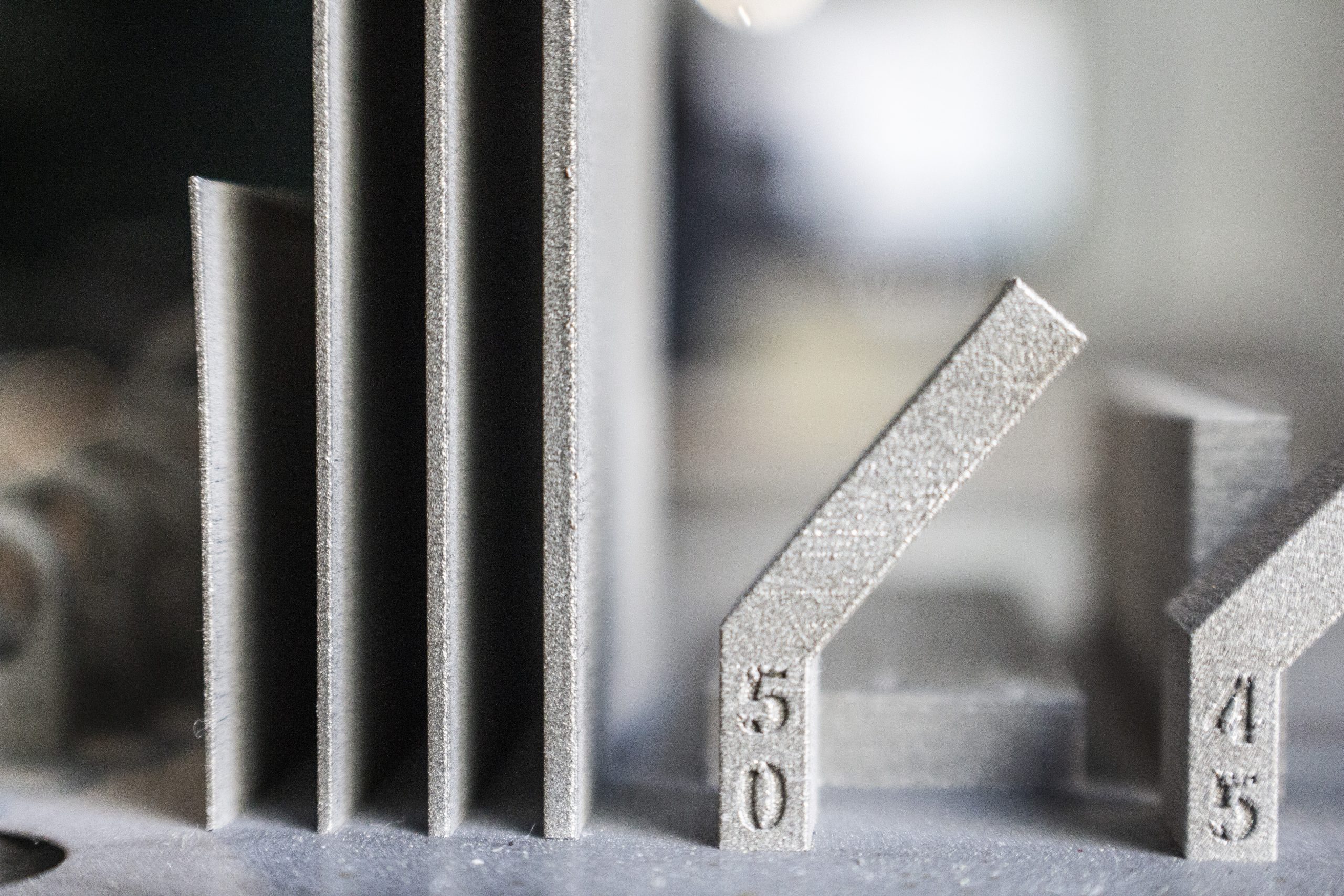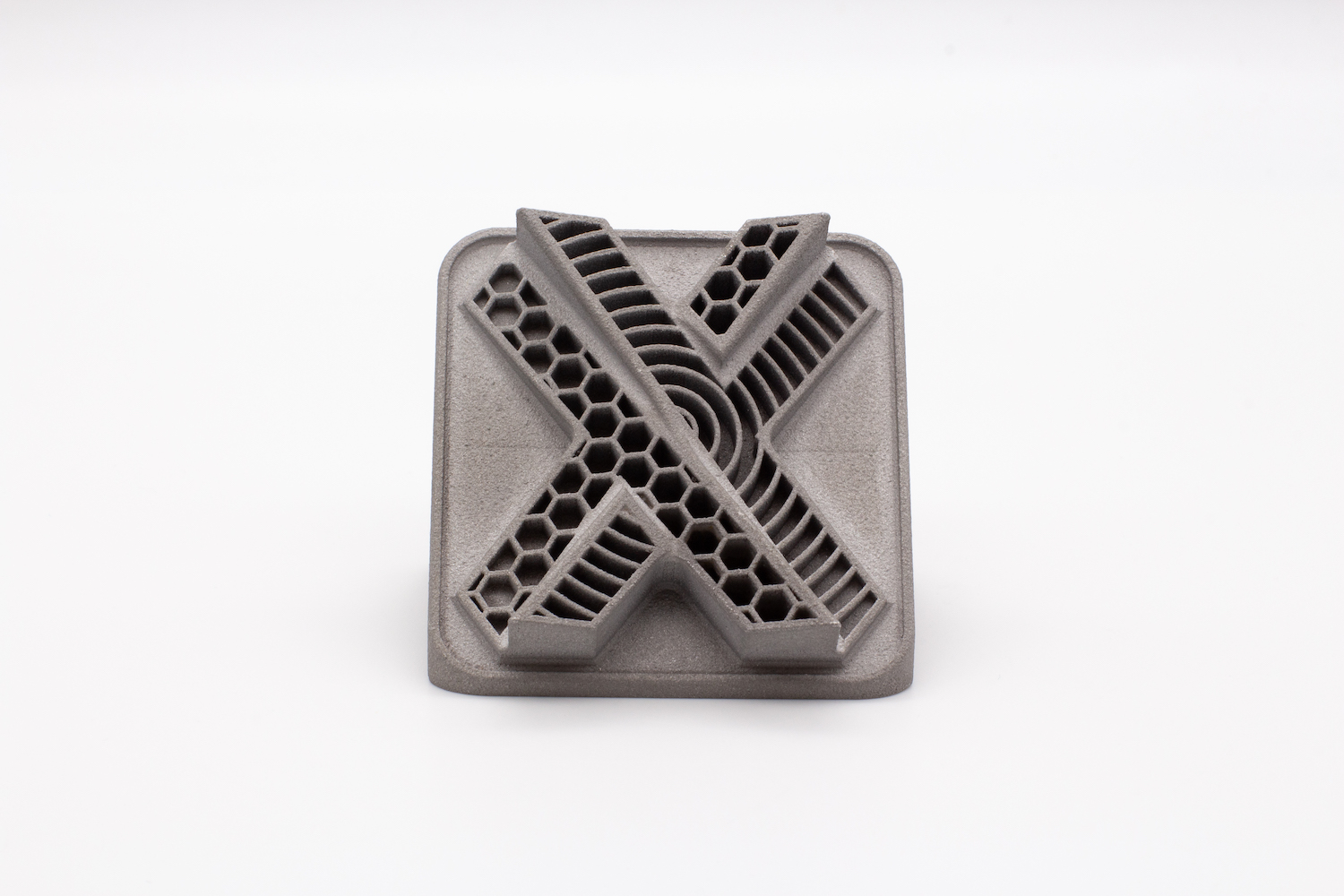Metal 3D Printing (DMLS) 3D Printing Services
- Free Delivery
- DMLS / SLM / DMLM 3D Printing Services Online
- Aluminium and Stainless Steel
- Manufacturing From 10 Business Days
Start A New 3D Printing Quote
STEP | STP | SLDPRT | STL | IPT | 3DXML | CATPART | PTC | PRT | SAT
Metal 3D Printing (DMLS) Capacities
Direct Metal Laser Sintering (DMLS), also known as Selective Laser Melting (SLM) and Direct Metal Laser Melting (DMLM), is a metal 3D printing technology that selectively fuses a fine metal powder in aluminium or stainless steel. This 3D printing technology is used to manufacture both prototypes and production parts, especially with very complex features and all-in-one assemblies.
Try Xometry Out Now In Just A Few Steps
Multiple designs for different parts can be imported at the same time to produce a single quote. In less than a minute, a detailed cost estimation appears on the screen.
First, select the manufacturing process you require. You can then choose from over 70 materials, both metals and plastics, and from a wide range of finishes and certifications.
Once you have selected the required options, all you need to do is confirm the order and pay for it on the secure payment platform. Your design will be analysed by engineers.
Within a short amount of time, you will receive the parts you ordered directly to your shipping address. You can track your package at any time in your personal account.
Advantages of DMLS with Xometry
Massive Capacity
We can quickly produce both prototypes and large batches thanks to the largest manufacturing network in Europe, with over 2000 vetted partners
Fast Production
You will get your 3D printed parts fast delivered in as fast as 10 days.
Quality Assurance
We have strong QA procedures, controlled by an in-house team of QA engineers, which allows us to deliver high quality parts.
Engineering Check & Status Updates
All designs are checked by engineers before they’re sent for 3D printing. After confirming your order, you will receive status updates on your production.
Request a Quote for Your Parts Now
Upload Your CAD DesignMaterials for DMLS 3D Printing
- Aluminium Al-Si10Mg
- Cobalt chrome / CoCr
- Tool steel 1.2709 / MS1
- Stainless Steel 17-4PH / 1.4542 / X5CrNiCuNb16-4
- Stainless Steel 316L / 1.4404 / X2CrNiMo17-12-2
- Inconel 718
- Titan Grade 5 / 3.7164 / 3.7165 / Ti-6Al-4V
DMLS Resolution (Layer Thickness) Options
Layer thickness refers to the height of each layer added during the additive manufacturing or 3D printing procedure, where multiple layers are stacked upon one another to create the final product The choice of layer thickness (resolution) directly impacts the visual aesthetics, overall properties, and strength of the end parts.
Xometry offers three layer thicknesses:
- Economy (>60 µm): Cost-effective solution with faster build times, making it suitable for less detailed prints. It comes with lower strength attributed to thicker layers, making it more appropriate for less demanding applications where intricate details and surface resolution are not a primary concern.
- Standard (40-60 µm): Balanced choice between detail and cost, versatile and commonly used solution for general-purpose parts. With a balanced strength and resolution, this option proves adequate for a wide range of applications.
- Fine (<40 µm): High detail resolution, ideal choice for intricate and precise components. Despite longer build times, it offers a superior surface finish and ensures higher strength with finer details. This option is particularly well-suited for the production of intricate and high-stress components where precision and strength are paramount.

Pros & Cons of DMLS 3D Printing
| Advantages | Considerations |
|---|---|
| Complex Geometries: DMLS makes it possible to manufacture parts that cannot be produced with subtractive manufacturing | Surface roughness is higher than with CNC machining |
| Powdered metals used for DMLS 3D printing possess strong mechanical properties | Higher costs than other manufacturing technologies |
| Variety of mechanical and electro-chemical post-processing options applicable for final part enhancement | Limited volume size |
DMLS Manufacturing Specifications & Capabilities
| DMLS | SLS | HP MJF | SLA | FDM | Carbon DLS | Polyjet | |
|---|---|---|---|---|---|---|---|
|
Lead time |
10 days |
3 days |
3 days |
7 days |
8 days |
5 days |
7 days |
|
Build volume |
400 x 400 x 400 mm |
up to 340 x 340 x 605 mm, but usually, we recommend the maximum size of 320 x 320 x 580 mm |
up to 380 x 284 x 380 mm, while we normally recommend the maximum size of 356 x 280 x 356 mm |
• 145 × 145 × 185 mm (Standard) |
• 350 x 350 x 350 mm (Standard) |
up to 119 x 189 x 300 mm. Recommended size: Within 100 x 100 x 150 mm |
up to 490 mm x 391 mm x 200 mm |
|
Layer thickness |
0.02 – 0.08 mm depending on the material |
~0.1 mm and for water-tight parts 1.5 mm, when wall thickness is higher |
~0.08 mm |
min 0.02 |
~0.05-0.3 mm |
~0.1 mm |
0.04 mm |
|
Minimum feature size |
0.75 mm for cosmetic features, 1.5 mm for structural features |
0.5 mm |
0.5 mm |
0.2 mm |
up to 0.2 mm |
0.5 mm |
1.2 mm or greater for rigid. 2 mm or greater for rubber-like |
|
Tolerance |
±0.2% (±0.1 – 0.2 mm) |
±0.3% (± 0.3 mm) |
±0.3% (± 0.2 mm) |
• ±0.5% (±0.2 mm) (Standard) |
±0.5% (±0.5 mm) (Standard & Industrial) |
±0.1% (±0.1 mm). However, tolerances are not guaranteed on the first attempt at a new design. |
±0.1 mm for the first dozens of mm is typical, plus ±0.05 mm for every mm thereafter |
|
Description |
Metal 3D printing technology. Selectively fuses a fine metal powder in aluminium or stainless steel |
One of the most popular and inexpensive technologies for industrial 3D printing |
A technology that produces highly accurate and durable parts at fast speeds, especially compared to other powder bed fusion technologies |
A technology that produces extremely accurate and high-resolution parts |
Widely known for a great material selection, accuracy, and possibility to print large parts |
A breakthrough technology that uses digital light projection, programmable liquid resins, and oxygen-permeable optics to produce parts with exceptional durability, resolution, and surface finish |
Polyjet is a rigid photopolymer 3D printing technology that produces high-detailed models |
|
Support structures |
Yes, for overhanging features |
No |
No |
Yes, for overhanging features |
Yes, for overhanging features |
Yes, for overhanging features |
Yes, for overhanging features |
Xometry Also Offers These Services
Order 3D Printed Parts Online
All uploads are secure and confidential.
 Europe
Europe  United Kingdom
United Kingdom  Türkiye
Türkiye  USA & Canada
USA & Canada  Asia
Asia  الشرق الأوسط
الشرق الأوسط 



